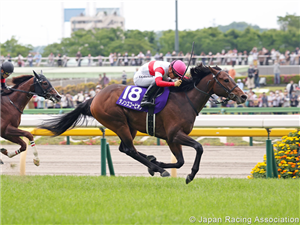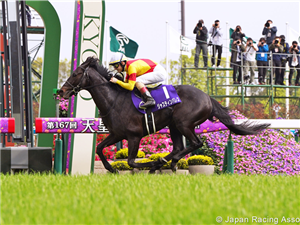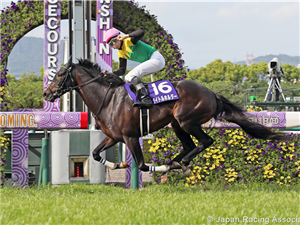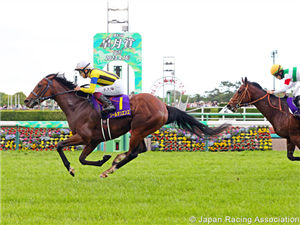The 58th running of the Copa Republica Argentina will be held on Sunday, November 8th and it is a 2,500 meter turf event at Tokyo Racecourse.
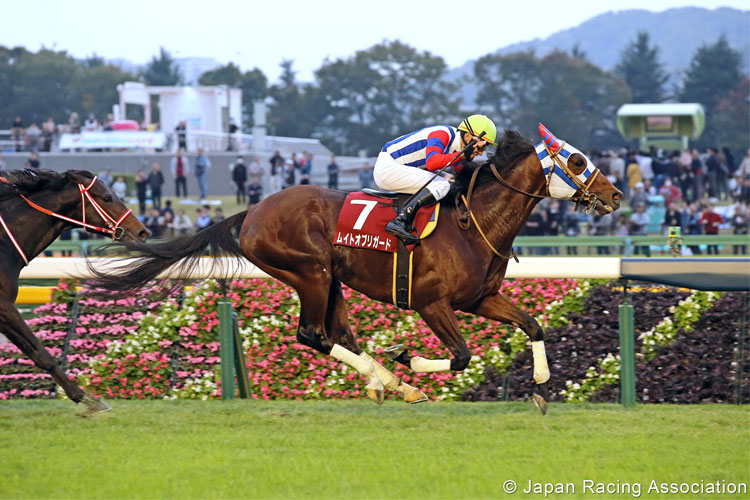
The past three weeks of JRA racing have been filled with one historic moment after another. Each week has featured a top-level competition that has been headlined by an overwhelming favorite and matching rock-bottom odds. And, each week that favorite has earned a spot in racing history and taken home top prize.
This Sunday's main event at Tokyo is the Grade 2 Copa Republica Argentina run over 2,500 meters. Though You Can Smile, who has made the board in his four Grade 1 bids thus far, is expected to emerge the race favorite, there are any number of other contestants considered just as capable of claiming the JPY57 million winner's share.
This year has attracted 22 nominees for the Copa Republica Argentina, open to 3-year-olds and up. The nominees are all male, including three geldings, and range in age from 3 to 8. Eighteen from among them will be given a berth in the 58th running of the turf event that is the same length as the yearend Arima Kinen (The Grand Prix) and only one of two 2,500-meter races held at Tokyo Racecourse, the other being the Meguro Kinen in the spring.
This week's field will include five horses who ran in the 2020 Meguro Kinen. And, though the venue and the distance are the same, there will be one variant more than the usual - the weight each horse will carry. The Copa Republica Argentina, like the Meguro Kinen, is a handicap race, with different assigned weights aimed at leveling the playing field. This year, weights assigned the Copa Argentina nominees vary from a low of 51 kg to a top weight of 58 kg assigned You Can Smile.
The Copa Argentina doesn't particularly favor the most popular, though neither does it cater to longshots. The No. 1 choice of the field has only won the race four times in the last 20 runnings, but has made the top three in half of the runnings over the same period. The second and third picks, especially the former, have fared much better, with either making the top three in 90 percent of the past 20 runnings. Double-digit longshots have only rocked the top three spots five times over the same period and won only once, in 2015, the year another longshot took third.
The Copa Republica Argentina race record of 2 minutes 29.9 seconds was set in 2012 by Lelouch, the course record of 2 minutes 28.2 seconds by Look Twice last year. The race is the No. 11 race on the Tokyo Sunday card of 12. Post time is 3:35 p.m.
Here's a look at some of the runners expected to play a part in the race :
You Can Smile - A King Kamehameha-sired 5-year-old, You Can Smile has recorded 3-5-4-5-4 in Grade 1 company and returns to the track for the first time in 6 months following his run in the Tenno Sho (Spring). Though this will be the longest time between races, he has done well before, including a win of the Grade 3 Niigata Kinen upon returning four months after last year's spring Tenno Sho. Fifth in the Grade 1 Japan Cup at Tokyo last year, the extra distance should be a plus though he'll be running under 58 kg, 1 kg more than his JC assigned weight and 1 kg more than he has ever won under.
Meisho Tengen - A Deep Impact 4-year-old, Meisho Tengen has failed to win since the Grade 2 Yayoi Sho in March 2019. Considered to be a late bloomer like his dam Meisho Beluga, the colt was impressive in the Takarazuka Kinen and has a second-place finish in the Grade 3 Diamond Stakes over the Tokyo 3,400 meters. According to trainer Kaneo Ikezoe, the more distance will be better for him and a bit of spring to the track would also be appreciated. He will be running under 2 kg less than he carried in his last two starts, but this will be his longest time between races.
Ocea Great - A 4-year-old by Orfevre, Ocea Great recorded 3-5-6 in his last three starts at Tokyo, all this year, and ranging from 2,400 to 3,400 meters. He finished third in the Metropolitan Stakes a full five lengths behind Meisho Tengen but held his ground the best of those who raced from a forward position. Fifth in his next graded-stakes start, the Meguro Kinen, Ocea Great returns from four months off after a poor showing in the 2,000-meter Tanabata Sho. He is, however, looking good in work. Trainer Masatoshi Kikukawa says the conditions and distance this time are "perfect for him."
Sanrei Pocket - A Jungle Pocket-sired 5-year-old, Sanrei Pocket has made the top three spots in his nine starts since last fall. Returning after three months in September he finished third in the Grade 3 Niigata Kinen, then was third again in the Grade 2 Mainichi Okan at Tokyo. Primarily raced in the 1,800-2,000-meter range, he did, however, win the June Stakes, a three-win class race over the Tokyo 2,400 meters, and given his 2-1-1-2-1-3-3 record racing to the left, should do well here again. He'll race under 1 kg less than he did for the Mainichi Okan.
Authority - After winning his first graded stakes race, the Grade 2 TV Tokyo Hai Aoba Sho at Tokyo in record time, the Orfevre-sired Authority was found to have suffered a chip fracture. The chip was removed and he was back under saddle from July and in training from five weeks ago. His Aoba Sho performance indicates he can most likely handle the Copa Republica Argentina and should be helped by carrying 2 kg less than he did in the Aoba Sho. He is returning for his first race in six months and it will be his first race competing against older horses.
Others to watch are :
Gold Gear was fifth in the Meguro Kinen, but ran out of ground too soon in the 2,000-meter Niigata Kinen. The extra 500 meters will be a plus this time and he'll run under the same weight as his last two starts. Satono Lux was runnerup in last year's Kikuka Sho (Japanese St.Leger), returned this year after eight months off and recorded 8-11 in two starts over 2,000 meters. Cooler days and more distance this time should help. Tosen Cambina finished only 0.3 seconds off You Can Smile in the 3,000-meter Hanshin Daishoten in March and beat Meisho Tengen to the wire. He followed that up with a 5-8 in two G1s, then returned after four months off for a prep that should have him primed for an upset carrying his lightest load since the Hanshin Daishoten. Not to be overlooked is Valerio, runnerup in both the Metropolitan Stakes and last out in the Sapporo 2,600 meters Tancho Stakes.


